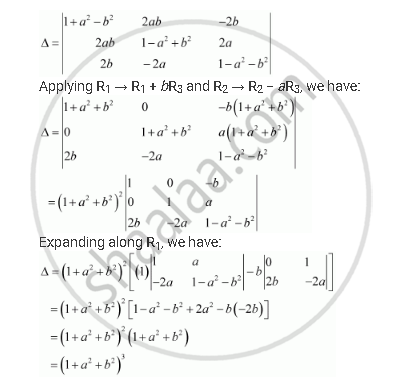Advertisements
Advertisements
प्रश्न
By using properties of determinants, show that:
`|(1+a^2-b^2, 2ab, -2b),(2ab, 1-a^+b^2, 2a),(2b, -2a, 1-a^2-b^2)| = (1+a^2+b^2)`
उत्तर

APPEARS IN
संबंधित प्रश्न
Using properties of determinants, show that ΔABC is isosceles if:`|[1,1,1],[1+cosA,1+cosB,1+cosC],[cos^2A+cosA,cos^B+cosB,cos^2C+cosC]|=0`
Using properties of determinants, prove that
`|[x+y,x,x],[5x+4y,4x,2x],[10x+8y,8x,3x]|=x^3`
Using the property of determinants and without expanding, prove that:
`|(a-b,b-c,c-a),(b-c,c-a,a-b),(a-a,a-b,b-c)| = 0`
Using the property of determinants and without expanding, prove that:
`|(1, bc, a(b+c)),(1, ca, b(c+a)),(1, ab, c(a+b))| = 0`
By using properties of determinants, show that:
`|(y+k,y, y),(y, y+k, y),(y, y, y+k)| = k^2(3y + k)`
By using properties of determinants, show that:
`|(a-b-c, 2a,2a),(2b, b-c-a,2b),(2c,2c, c-a-b)| = (a + b + c)^2`
By using properties of determinants, show that:
`|(a^2+1, ab, ac),(ab, b^2+1, bc),(ca, cb, c^2+1)| = 1+a^2+b^2+c^2`
Using properties of determinants, prove that:
`|(1, 1+p, 1+p+q),(2, 3+2p, 4+3p+2q),(3,6+3p,10+6p+3q)| = 1`
Solve for x : `|("a"+"x","a"-"x","a"-"x"),("a"-"x","a"+"x","a"-"x"),("a"-"x","a"-"x","a"+"x")| = 0`, using properties of determinants.
Using properties of determinants, show that `|("a" + "b", "a", "b"),("a", "a" + "c", "c"),("b", "c", "b" + "c")|` = 4abc.
Solve the following equation: `|(x + 2, x + 6, x - 1),(x + 6, x - 1,x + 2),(x - 1, x + 2, x + 6)|` = 0
If `|(4 + x, 4 - x, 4 - x),(4 - x, 4 + x, 4 - x),(4 - x, 4 - x, 4 + x)|` = 0, then find the values of x.
Without expanding determinants, prove that `|(1, yz, y + z),(1, zx, z + x),(1, xy, x + y)| = |(1, x, x^2),(1, y, y^2),(1, z, z^2)|`.
Without expanding the determinants, show that `|("b" + "c", "bc", "b"^2"c"^2),("c" + "a", "ca", "c"^2"a"^2),("a" + "b", "ab", "a"^2"b"^2)|` = 0
Without expanding the determinants, show that `|(0, "a", "b"),(-"a", 0, "c"),(-"b", -"c", 0)|` = 0
Without expanding determinants show that
`|(1, 3, 6),(6, 1, 4),(3, 7, 12)| + 4|(2, 3, 3),(2, 1, 2),(1, 7, 6)| = 10|(1, 2, 1),(3, 1, 7),(3, 2, 6)|`
Select the correct option from the given alternatives:
The determinant D = `|("a", "b", "a" + "b"),("b", "c", "b" + "c"),("a" + "b", "b" + "c", 0)|` = 0 if
Select the correct option from the given alternatives:
Let D = `|(sintheta*cosphi, sintheta*sinphi, costheta),(costheta*cosphi, costheta*sinphi, -sintheta),(-sintheta*sinphi, sintheta*cosphi, 0)|` then
Select the correct option from the given alternatives:
If `|(6"i", -3"i", 1),(4, 3"i", -1),(20, 3, "i")|` = x + iy then
Answer the following question:
Without expanding determinant show that
`|(0, "a", "b"),(-"a", 0, "c"),(-"b", -"c", 0)|` = 0
Answer the following question:
If `|("a", 1, 1),(1, "b", 1),(1, 1, "c")|` = 0 then show that `1/(1 - "a") + 1/(1 - "b") + 1/(1 - "c")` = 1
Evaluate: `|("a" + x, y, z),(x, "a" + y, z),(x, y, "a" + z)|`
Evaluate: `|(0, xy^2, xz^2),(x^2y, 0, yz^2),(x^2z, zy^2, 0)|`
If `[(4 - x, 4 + x, 4 + x),(4 + x, 4 - x, 4 + x),(4 + x, 4 + x, 4 - x)]` = 0, then find values of x.
The determinant `|("b"^2 - "ab", "b" - "c", "bc" - "ac"),("ab" - "a"^2, "a" - "b", "b"^2 - "ab"),("bc" - "ac", "c" - "a", "ab" - "a"^2)|` equals ______.
If A, B and C are angles of a triangle, then the determinant `|(-1, cos"C", cos"B"),(cos"C", -1, cos"A"),(cos"B", cos"A", -1)|` is equal to ______.
The determinant `abs (("a","bc","a"("b + c")),("b","ac","b"("c + a")),("c","ab","c"("a + b"))) =` ____________
`abs(("x", -7),("x", 5"x" + 1))`
`f : {1, 2, 3) -> {4, 5}` is not a function, if it is defined by which of the following?
If A, B and C are the angles of a triangle ABC, then `|(sin2"A", sin"C", sin"B"),(sin"C", sin2"B", sin"A"),(sin"B", sin"A", sin2"C")|` = ______.
Without expanding determinants find the value of `|(10,57,107),(12,64,124),(15,78,153)|`
Without expanding determinants find the value of `|(10, 57, 107),(12, 64, 124),(15, 78, 153)|`
Without expanding determinants find the value of `|(10,57,107),(12,64,124),(15,78,153)|`
Evaluate the following determinant without expanding:
`|(5, 5, 5),(a, b, c),(b + c, c + a, a + b)|`
By using properties of determinant prove that `|(x+y, y+z,z+x),(z,x,y),(1,1,1)|=0`
Without expanding determinant find the value of `|(10,57,107),(12,64,124),(15,78,153)|`
Without expanding the determinant, find the value of `|(10,57,107),(12,64,124),(15,78,153)|`
